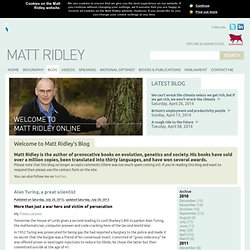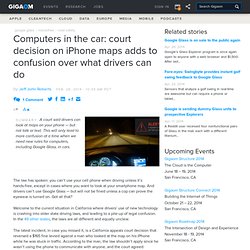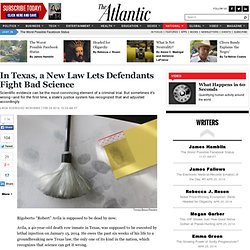

Alan Turing, a great scientist - Matt Ridley. My Times column: Tomorrow the House of Lords gives a second reading to Lord Sharkey’s Bill to pardon Alan Turing, the mathematician, computer pioneer and code-cracking hero of the Second World War.

In 1952 Turing was prosecuted for being gay (he had reported a burglary to the police and made it no secret that the burglar was a friend of his consensual lover). Convicted of “gross indecency” he was offered prison or oestrogen injections to reduce his libido; he chose the latter but then committed suicide at the age of 41. That Turing deserved an apology in his lifetime for this appalling treatment is not in doubt. What will be debated tomorrow is whether a posthumous pardon from today’s Government is right, or may be a further insult to his memory. So it is not easy to judge if a pardon is the right thing.
In 1936, aged 24, Turing wrote: “We may now construct a machine to do the work of this computer.” To which Dennett replies: “Exactly!” Frans de Waal: Moral behavior in animals. Computers in the car: court decision on iPhone maps adds to confusion over what drivers can do. The law has spoken: you can’t use your cell phone when driving unless it’s hands-free, except in cases where you want to look at your smartphone map.

And drivers can’t use Google Glass — but will not be fined unless a cop can prove the eyewear is turned on. Got all that? Welcome to the current situation in California where drivers’ use of new technology is crashing into older state driving laws, and leading to a pile-up of legal confusion. In the 49 other states, the laws are all different and equally unclear. The latest incident, in case you missed it, is a California appeals court decision that reversed a $165 fine levied against a man who looked at the map on his iPhone while he was stuck in traffic. Spriggs contends he did not violate the statute because he was not talking on the telephone. The result is fair: people have always checked maps while driving, so why should it be different when the map is on a phone? In Texas, a New Law Lets Defendants Fight Bad Science - Linda Rodriguez McRobbie. Scientific evidence can be the most convincing element of a criminal trial.

But sometimes it's wrong—and for the first time, a state's justice system has recognized that and adjusted accordingly. Tomas Bravo/Reuters Rigoberto “Robert” Avila is supposed to be dead by now. Avila, a 40-year-old death row inmate in Texas, was supposed to be executed by lethal injection on January 15, 2014. He owes the past six weeks of his life to a groundbreaking new Texas law, the only one of its kind in the nation, which recognizes that science can get it wrong.
The crime that Avila was convicted of, and that he has steadfastly claimed he didn’t commit, is truly difficult to fathom: the murder of a 19-month-old boy. Dylan told investigators that he and Nicholas had been roughhousing when Nicholas stopped breathing; Avila was not in the room. The second reason seemed much harder to refute: Medical experts at the time claimed that there was no other possible explanation for the child’s death.